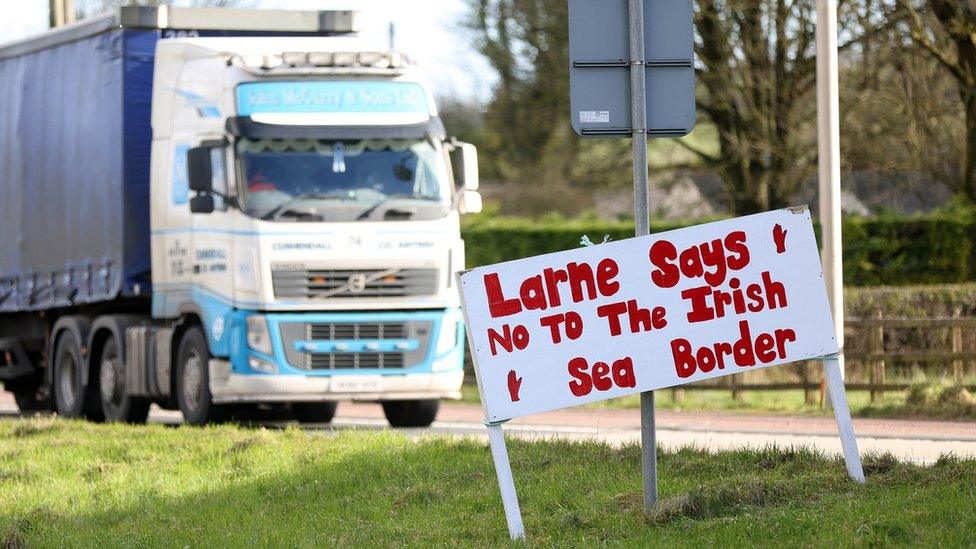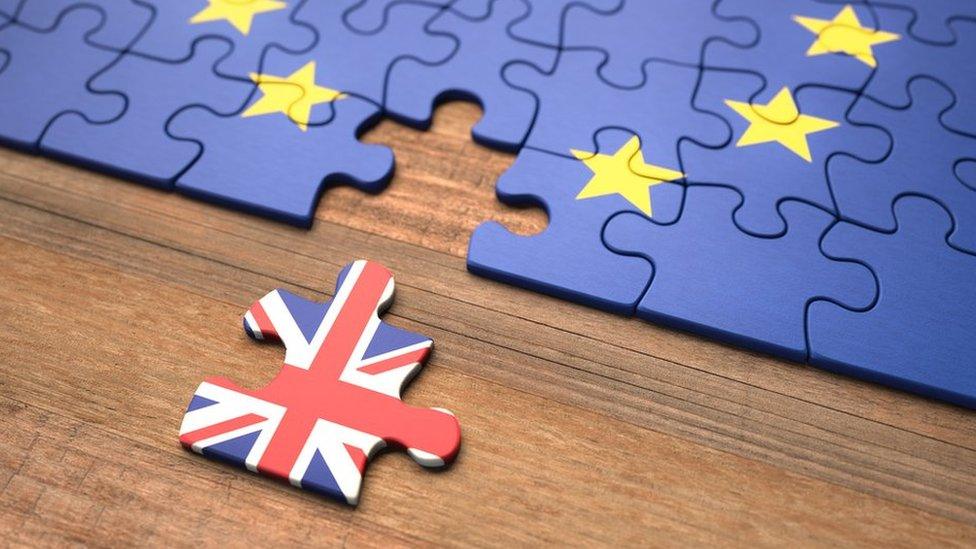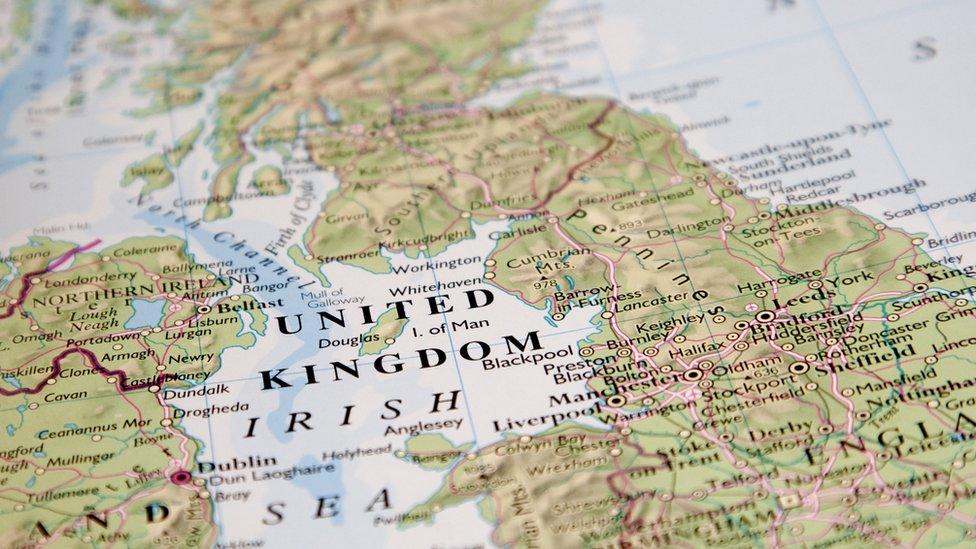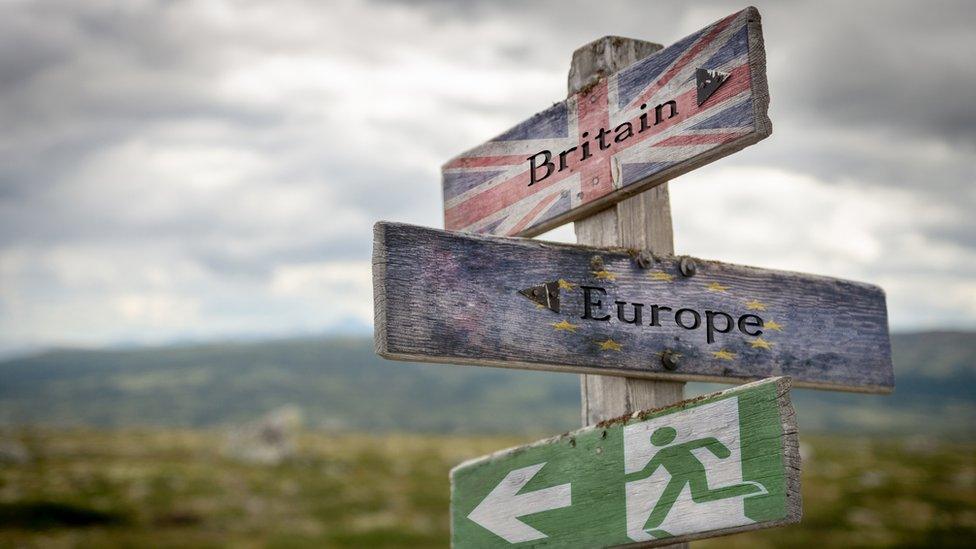Brexit: Can the Northern Ireland Protocol be tweaked?
- Published

There has been strong Unionist opposition to the new Irish Sea border
It is not often in the past five years that Irish MEPs have shared a Brexit position with the UK government.
But that happened this week when a cross-party group of MEPs suggested that the EU should extend the Irish Sea border "grace periods".
These are periods ranging from three months to a year where the EU's usual rules on customs and product standards are not being fully enforced on GB-NI trade across the Irish Sea border.
The UK government wants the grace periods extended all the way out to 2023.
Northern Ireland businesses have added their voices to calls for an extension.
But an extension for what purpose?
Is it to give businesses more time to adapt by training, switching supply chains and updating their systems and processes?
Or is it to provide breathing space in which the EU and UK could agree to make changes to the operation of the Northern Ireland Protocol, the Brexit deal which created the Irish Sea border?
A range of ideas for changing the Protocol have been put forward.
Swiss-style
Alliance, a centrist party in Northern Ireland, has suggested that the UK and EU should seek a new enhanced agreement on agri-food products., external
The movement of food and plants from GB-NI have caused the biggest practical problems in NI.
This is because the broader EU/UK deal, the Trade and Cooperation Agreement (TCA), contains a very limited section on agrifood products.
The result is that GB food products entering the EU or NI face a range of onerous processes and checks.
Alliance MP Stephen Farry has suggested there could be a comprehensive veterinary agreement, along the lines of the EU's agreement with Switzerland.

The Swiss follow EU rules on rules on food safety and animal health almost to the letter.
As a consequence there have been no border regulatory controls for trade in animals and animal products between Switzerland and the EU since 2009.
But under the deal Switzerland must keep updating its rules in line with the EU but has a minimal role in formulating those rules.
The details are made clear by Switzerland's Federal Food Safety and Veterinary Office (FSVO).
It states: "Switzerland seeks to represent its position to the EU when legislation is being drafted and as scientific developments occur.
"It does this by participating in working groups and in the standing committee.
"Its scope for influence is, however, limited since Switzerland does not have voting rights."
This option is not likely to be very attractive to a UK government which has prioritised UK regulatory independence.

This week the UK's chief negotiator, Lord Frost, told a House of Lords Committee he doesn't envisage anything needing to be added to the TCA.
But a close reading of an answer given to Mr Farry this week by Cabinet Office Minister Michael Gove suggests the door to a veterinary agreement is not entirely closed.
Mr Gove said: "We want to look at a range of pragmatic solutions, and I am grateful to him and his colleagues for putting forward a potential way forward in a constructive spirit.
"There is no single right way forward."
Alliance has also suggested a further two options.
One is effectively a more informal version of the Swiss deal, where the UK could agree to align with EU rules and update its own legislation in line with any changes in the EU during whatever period is necessary.
Finally there is an option for a bespoke NI agreement building on the existing grace period for supermarkets and using the supermarkets' own logistics and audit system to provide a trusted trader system for food movements.
The UK supermarkets were pressing this idea last year but the EU was not keen at that time.
Centre for European Reform
Sam Lowe a trade policy expert at the Centre for European Reform, a broadly pro-EU think tank, also suggests a veterinary agreement., external
He acknowledges it would restrict the UK's ability to accept American food standards as part of a future UK-US trade deal, but says it "would significantly reduce trade friction both within the UK, and with the EU, to the benefit of UK farmers."
But he also thinks the EU has room to often further flexibility.
As an example he suggests it could allow permanent derogations specific to the island of Ireland (potentially only for registered suppliers) allowing for chilled meat products, seed potatoes, soil and some other products to be imported from GB.
"As a distinct biosphere, separate from the rest of the EU, such island-of-Ireland-specific rules for food and plant products would be justifiable," he states.
At the moment the EU does not appear persuaded on major derogations of that sort.
Ulster Unionist proposals
Like other unionist parties in NI, the Ulster Unionist Party (UUP) is opposed to the Protocol.
But earlier this month it suggested ways in which the UK government could act unilaterally to improve its operation, external.
The most eye-catching proposal is that the government should legislate to ensure Northern Ireland consumers are treated equally by online retailers.
Online shopping has felt significant practical impacts from the Protocol.

Goods moving across the Irish Sea border involves a range of new processes, checks and documentation
A grace period for most parcels going for GB to NI means that nothing should have changed.
But this grace period was announced very late, just hours before the Brexit transition period expired.
So in practice the picture with online retailing from GB to NI is messy.
Some companies, such as John Lewis, have suspended deliveries and others have increased delivery times.
The UUP has said the government could "legislate to put in place a requirement on companies based in Great Britain to ensure equality of provision to all regions of the UK internal market."
This could have a significant impact on retailers - for example some firms treat deliveries to Scotland's Highlands and Islands differently for reasons of geography.
The government is understood to be taking this UUP suggestion seriously.
They are looking at option in this area but don't want to end up with a crude policy which would unduly burden small companies.
Centre for Brexit Policy
The Centre for Brexit Policy, a strongly pro-Brexit think tank, has produced an updated version of a concept it calls mutual enforcement., external
This is a radical plan which would effectively ditch the NI Protocol and end any border processes on goods moving from GB-NI.
Instead the processes would all take place on the island of Ireland but in a decentralised way with no frontier checks.
This would be focused on making exporters legally responsible, in their own jurisdiction, for ensuring any products they sent across the border met all customs and regulatory requirements of the importing territory.
For example, if a Northern Ireland trader was found to have sent a prohibited product across the border to the Republic of Ireland they would face a fine or other legal action within Northern Ireland.

The NI Protocol was designed to ensure there were no checks on the land border in Ireland
It is suggested that enforcement would take place at the importing premises or at point of sale.
The authors acknowledged that the agri-food issue would present a challenge to this plan, as it did to similar "alternative arrangements" ideas in the past.
"It is accepted that compliance with Ireland/EU and the UK's agri-food rules using Mutual Enforcement could present challenges," they stated.
"This is mainly because food safety rules are politically sensitive in the EU and the EU has chosen, where it suits the EU, to be highly prescriptive as to the method of enforcement."
The EU requires all products of animal origin such as meat and fish to pass through a border control post at an immediate point of entry into the single market.
It seems unlikely that they would be prepared to dilute their agri-food border controls in this way.
- Published2 February 2024

- Published6 February 2021

- Published2 February 2021
